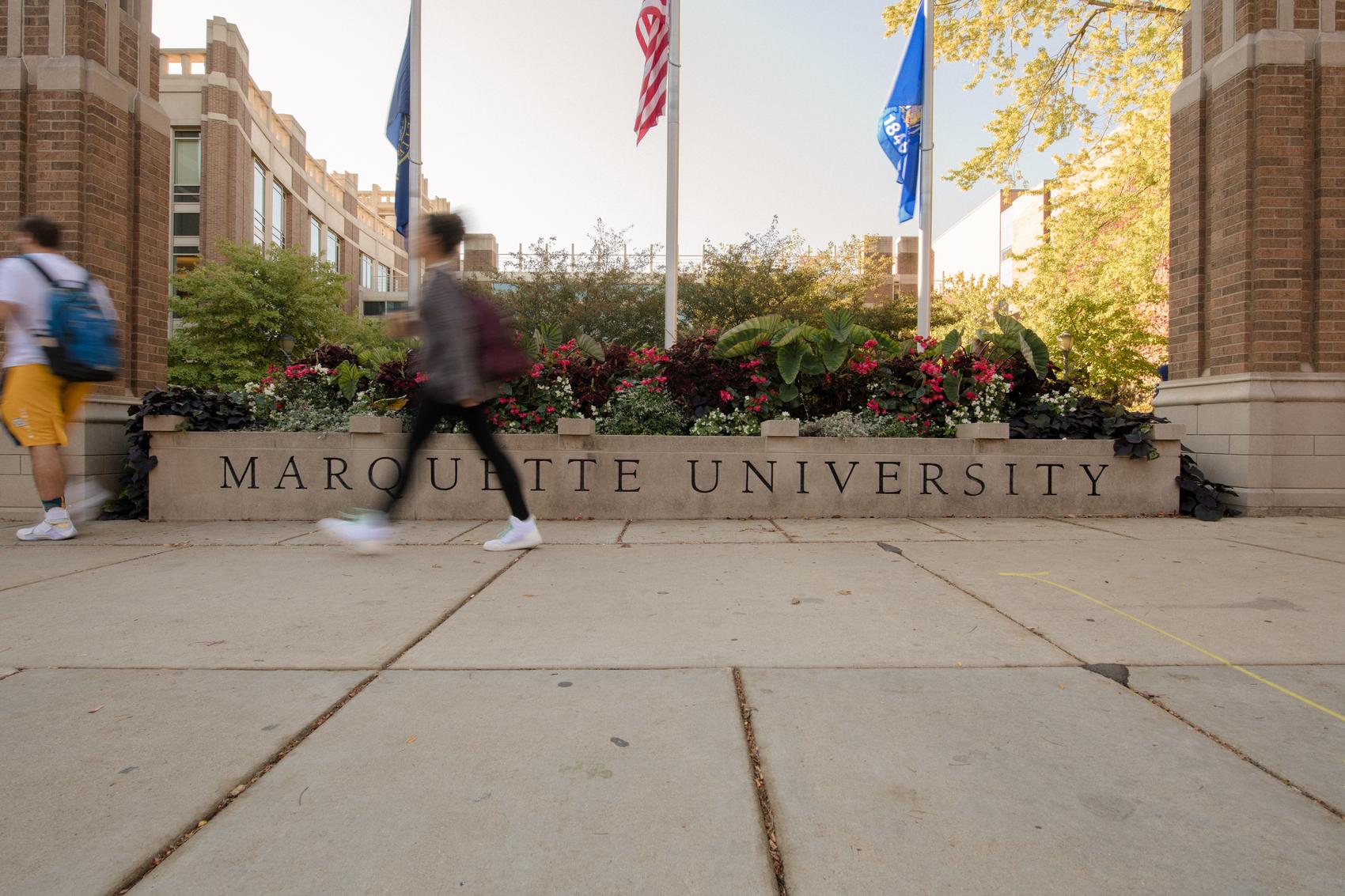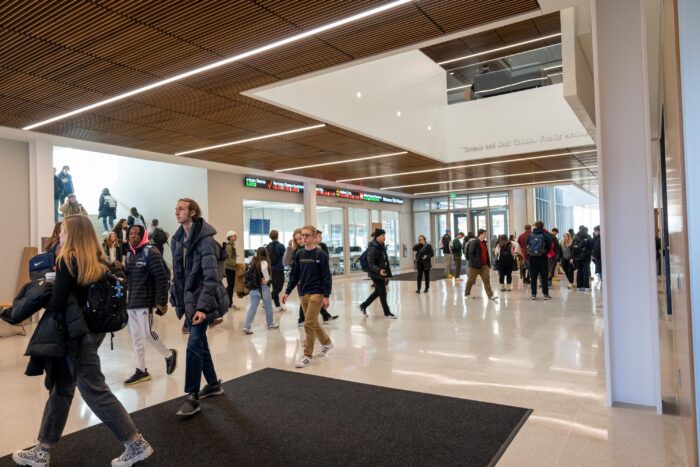This post ran on Sept. 28, 2022, and was updated on Oct. 19, 2022.
Dear Marquette community,
I am writing today to address information being circulated regarding our student conduct process and violations of the Student Conduct Code at New Student Convocation.
Marquette senior leaders, starting with President Lovell and me, recognize the frustrations that have been expressed regarding our campus climate and seek to have ongoing conversations in the spirit of making our university better. It is clear we still have work ahead to foster greater inclusivity and belonging in our campus community. Several leaders are working to convene these important discussions in the coming weeks.
It is also true that the way in which our students’ frustrations were shared at New Student Convocation in August prevented a planned, celebratory moment for thousands of members of the Class of 2026 and their families. A great deal of misinformation is circulating about what took place that day and the resulting student conduct process. Because we want to convene meaningful and open-minded conversations, it is important to clarify points of confusion so we can come together with informed perspectives. I encourage everyone to read the Q&A section below that addresses several critical points.
Although federal privacy laws prohibit the university from sharing details about specific student conduct cases, the process is clearly outlined in the Student Handbook. This process, which is reviewed on a regular basis, is utilized when students have acted contrary to our community Standards of Conduct. In the interest of fairness and to protect the due process rights of students, this standardized process does not change based on the nature of the violation or the students who are involved.
Importantly, the student conduct process is meant to address violations of the Student Conduct Code — it is not intended to address institutional climate issues.
We have been working in earnest to improve our campus climate, particularly with respect to ensuring we have appropriate staff support for our students of color. The Division of Student Affairs is currently in the process of hiring for four vacant positions in the Office of Engagement and Inclusion and is working with a dedicated recruiter to ensure a strong candidate pool. Each of those positions supports first-generation students and students of color on our campus. Additionally, a new staff member will be added to the growing Urban Scholars Program next year, as planned when we expanded the program.
While resources and programs are extremely important, we recognize that creating an inclusive, welcoming campus where everyone feels a strong sense of belonging cannot be the responsibility of one office or one area of campus. As Dr. Chris Navia shared in her inaugural message to campus a few weeks ago, “Our ability to stay in relationship with one another in these times of division and conflict depends on our willingness to shoulder the work of creating an inclusive campus climate ourselves, rather than relying on others to do it for us.”
Although the work in front of us is difficult, we have already made great progress and we look forward to having these important conversations and taking additional meaningful action.
Respectfully,
Dr. Kimo Ah Yun
Provost and Executive Vice President for Academic Affairs
Questions & Answers
Updated Oct. 7, 2022
What happened at New Student Convocation?
Some students reported that they planned a silent demonstration that was to happen concurrently with New Student Convocation regarding support for people of color on campus. This silent demonstration was planned to take place away from the scheduled New Student Convocation location. What transpired, however, was students occupying the New Student Convocation stage, shouting into their portable sound system, and preventing a planned, celebratory moment for the Class of 2026 and their families. While multiple senior university leaders repeatedly attempted to de-escalate the situation, students continued to occupy the stage and yell profanities, resulting in the cancelation and rescheduling of New Student Convocation.
What is the university doing to provide additional support and staffing resources for students of color?
Marquette is currently in the process of refilling positions in the Division of Student Affairs and is working with a dedicated recruiter to ensure a strong candidate pool. An assistant director for the Center of Engagement and Inclusion started in mid-October and the two graduate assistant positions in the Center for Engagement and Inclusion have been filled. The Director of Inclusion and Belonging is the new title for the director of the Center for Engagement and Inclusion, and the university is actively recruiting to fill this position, which is focused on support for first-generation students and students of color. Assistant Vice President of Student Affairs Dr. Joya Crear is leading the efforts of the Center for Engagement and Inclusion as we continue to recruit and hire for open positions.
In addition, the Counseling Center has hired three new counselors, two of which are diverse hires. Wellness and Prevention has hired three staff members and the Marquette University Medical Clinic has hired a new COVID-19 nurse. To support student organizations and events, the AMU and University Special Events have each filled vacant event planner positions, and an assistant director for the AMU has been hired.
Additionally, a new staff member will be hired for the Urban Scholars Program next year, as previously planned. While the university would certainly like to have all open positions filled immediately, Marquette is facing the same staffing and recruiting challenges as organizations nationwide and it takes time to find the right people to do this important work.
Have Marquette leaders met with the students who protested at Convocation to hear their concerns?
As student leaders, many of the students involved meet with university leadership regularly. The Marquette University Student Government president and vice president have regular meetings with the university’s vice president for student affairs, provost and president. The provost met with MUSG leadership every other week from when they were elected in spring 2022 until the week after the originally scheduled New Student Convocation. At that time, the provost opened the door to future meetings focused on restoring trust and being in person with MUSG leadership; the student leaders have not yet accepted that invitation.
Why are the provost and the president not involved in the student conduct process?
To ensure the conduct process is consistent no matter the issue or students involved, and to prevent influence, the process is designed to be completed independent of the university president and provost. It is facilitated by professionals in the Division of Student Affairs who adjudicate hundreds of student conduct cases annually. In the interest of fairness and to protect the due process rights of students, the process is outlined clearly in the Student Handbook.
Why were the student protestors subject to the student conduct process? What were the outcomes of the student conduct process?
Details and outcomes from student conduct cases are protected by the Family Educational Rights and Privacy Act (FERPA), a federal privacy law, and will not be disclosed by the university. Marquette stands firmly behind its student conduct process, which has adjudicated hundreds of cases each year for decades and is reviewed on a regular basis. It is important to note that there are a wide range of outcomes for students who go through the student conduct process, and an outcome for one student does not necessarily equate to the same outcome for another.
If the university does not share information about student conduct cases, then why am I hearing details from individuals and the media?
The Family Educational Rights and Privacy Act (FERPA), a federal privacy law, prohibits universities and university employees from disclosing information about students’ educational records, including student conduct cases, without written consent. Students may share information about their own educational records.
Some information circulated has mentioned “suspension in abeyance.” What does that mean?
“Suspension in abeyance” means suspension will not take effect nor appear on the students’ transcripts, provided they engage in no further violations of university policy and complete all outcomes by the respective deadline dates. In the event of any future finding of responsibility, the suspension would be enacted.
What are the next steps in the student conduct process? Are the students allowed to appeal the findings of the Student Conduct Hearing?
Students found responsible for a violation of Marquette’s standards of conduct may request an appeal of the decision within five working days. As clearly specified in the Student Handbook, appeals are written – they are not re-hearings and they are not granted on the basis of disagreement with the original decision.
Within five (5) working days of the receipt of the material pertinent to the appeal, the panel chair or administrator hearing the appeal will notify the student in writing of their decision to 1) deny the request for an appeal, 2) to inform the student of the outcome of an appeal decision or 3) to accept the appeal for review and indicate the timeline in which it will be reviewed, if more than 5 business days will be required for review. If a delay occurs, or additional time is needed, this administrator or panel chair will notify the student of the delay.
Why am I hearing that students involved must vacate leadership positions in student organizations?
The student conduct process is separate from student organization leadership policies. It is a longstanding policy outlined in Marquette’s student organization guidelines that the officers of all student organizations, as well as the elected and appointed senators and officials of MUSG, must be in good standing (not on academic or disciplinary probation) at the time of their election or appointment, and throughout their terms of office.



